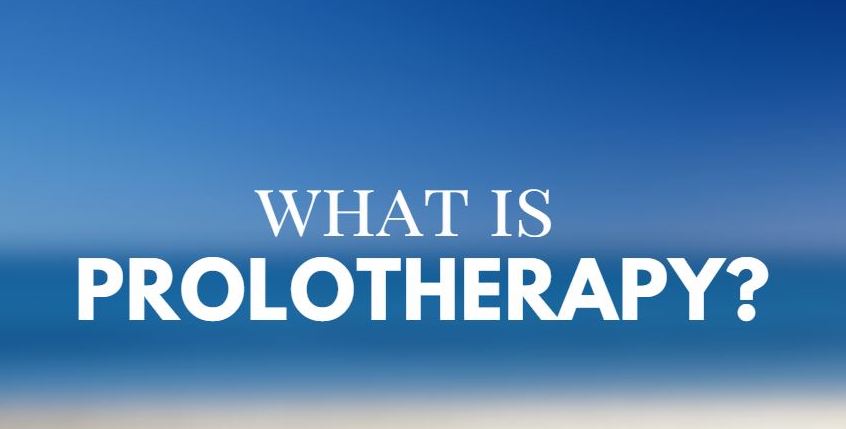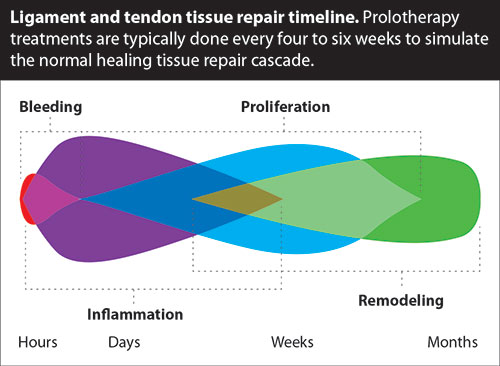PROLOTHERAPY
Indications
It is indicated in the treatment of different types of musculoskeletal pain, including
- osteoarthritis of knee,
- osteoarthritis of hip etc.
- back pain,
- neck pain,
- fibromyalgia
- sports injuries,
- carpal tunnel syndrome,
- Tendinopathies
- Temporal mandibular joint syndrome
- Lateral epicondylitis of the elbow
- Patellar tendinopathy
- Plantar fasciitis
- Shoulder joint pain

Procedure
Prolotherapy is a nonsurgical regenerative injection technique that introduces small amounts of an irritant solution to the site of painful and degenerated tendon insertions , joints, ligaments, and in adjacent joint spaces during several treatment sessions to promote growth of normal cells and tissues.
Ingredients of Prolotherapy (tissue proliferant):
- Osmotic agents like 10%-25% dextrose, glycerin.
- Agents that attach to the cell wall and stimulates growth like diluted phenol, ozone
- Platelet rich plasma
The most common prolotherapy agent used in clinical practice is dextrose, with concentrations ranging from 12.5% to 25%. Dextrose is considered to be an ideal proliferant because it is water soluble, a normal constituent of blood chemistry, and can be injected safely into multiple areas and in large quantity. Hypertonic dextrose solutions act by dehydrating cells at the injection site, leading to local tissue trauma, which in turn attracts granulocytes and macrophages and promotes healing. In vitro studies on human fibroblasts and chondrocytes exposure to extracellular dextrose concentrations of only 0.5% have resulted in the proliferation and production of a number of growth factors, several of which are essential to the repair, structural and functional integrity, and growth of tendons, ligaments, and other soft tissues. These include platelet-derived growth factor, transforming growth factor, epidermal growth factor, basic fibroblast growth factor, insulin-like growth factor, and connective tissue growth factorStimulation of the production of these key growth factors for ligaments, tendons, and cartilage through dextrose prolotherapy could be an inexpensive method of growth stimulation that may prove to be cost effective for the long term. When injected into tissue, exogenous dextrose has been found in animal and human studies to stimulate inflammatory response, ligament size, tendon hypertrophy, extracellular matrix, fibroblastic proliferation,and repair of articular cartilage defects.

Special Instructions
Side Effects And Complications
These are extremely rare. Main side effects are painful muscle spasm following injection, infection etc.
Procedures
- EPIDURAL STEROID BLOCK ( TFESI, CAUDAL, INTERLAMINAR )
- CERVICAL EPIDURAL NEUROPLASTY
- INTRAARTICULAR FACET BLOCKS
- MEDIAL BRANCH RFA FOR FACETOGENIC PAIN
- THIRD OCCIPITAL NERVE BLOCKS AND RFA
- C0-C1 and C1-C2 BLOCKS
- OCCIPITAL NERVE BLOCKS AND RFA
- SACROILIAC JOINT BLOCKS and RFA
- GASSERIAN RFA FOR TRIGEMINAL NEURALGIA
- BALLOON COMPRESSION FOR TRIGEMINAL NEURALGIA
- INTRAARTICULAR SHOULDER PROCEDURES
- PROLOTHERAPY
- PRP THERAPY
- GENICULAR NERVE RFA FOR KNEE PAIN
- LUMBAR SYMPATHECTOMY FOR LOWER LIMB ISCHEMIA & CRPS
- T2-T3 GANGLION NEUROLYSIS FOR UPPER LIMB ISCHEMIA AND CRPS
- STELLATE GANGLION BLOCKS AND RFA
- TRIGGER POINT INJECTIONS
- INTRARTICULAR TMJ PROLOTHERAPY
- KNEE JOINT INJECTIONS INCLUDING VISCOSUPPLEMENTATION
- CELIAC PLEXUS BLOCKS AND NEUROLYSIS
- SUPERIOR HYPOGASTRIC PLEXUS BLOCKS AND NEUROLYSIS
- GANGLION IMPAR BLOCK AND RFA